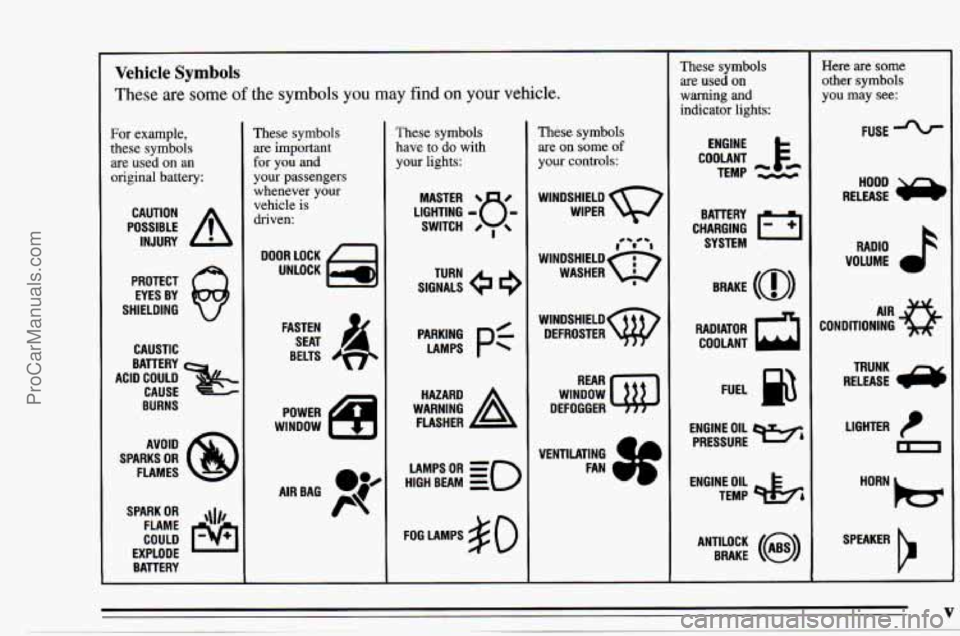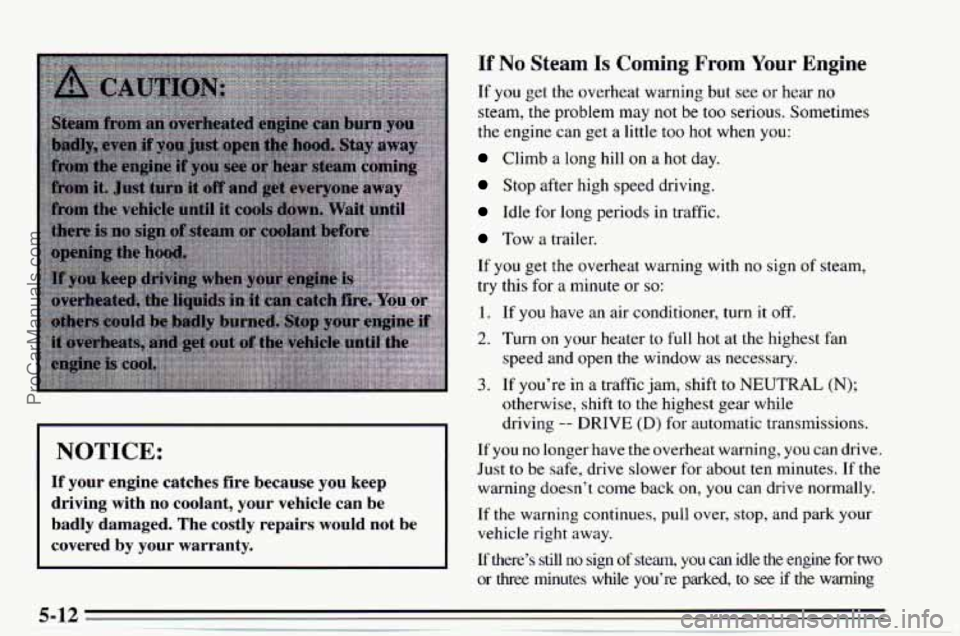Page 6 of 354

~~ Vehicle Symbols
These are some of the symbols you may find on your vehicle.
For example,
these symbols
are used on an
original battery:
POSSIBLE A
CAUTION
INJURY
PROTECT EYES BY
SHIELDING
CAUSTIC
ACID COULD BATTERY
CAUSE
BURNS
SPARK
OR ,\(I,
COULD FLAME
EXPLODE BAVERY
These symbols are important
for
you and
your passengers
whenever your
vehicle
is
driven:
DOOR LOCK
UNLOCK
FASTEN SEAT
&,
BELTS
POWER
WINDOW
LR
AIRBAG P@K
These symbols
have to
do with
your
lights:
SIGNALS e
TURN
PyN;
pf
WARNING A
HAZARD
FLASHER
HIGH
LAMPSoR BEAM = =o
FOG LAMPS $0
These symbols
are on some of
your controls:
WINDSHIELD
WIPER
,-/ 'I
WINDSHIELDQ
WASHER 8
wlNDSHIELDw DEFROSTER
WINDOW
DEFOGGER
These symbols are used on
warning and
indicator lights:
COOLANT F-
TEMP --
ENGINE
CHARGING
I-1
BATTERY SYSTEM
BRAKE
(a)
RADIATOR a
COOLANT
FUEL
ENGINE OIL
e,
PRESSURE
TEMP
OIL pk;
ANTIU)CK BRAKE (i)
~
Here are some
other symbols
you may see:
FUSE -%-
RADIO h
VOLUME a
CONDITIONING AIR 43
LIGHTER
m
SPEAKER
b
V
. ~ ProCarManuals.com
Page 89 of 354

Engine Coolant Temperature Gage
This gage shows the engine coolant temperature. If the
gage pointer move to the
H (red) side, your engine is too
hot! It means that your engine coolant has overheated
and you should stop your vehicle and turn
off the engine
as soon as possible.
Hot Coolant Can Burn You Badly!
In “Problems on the Road,” this manual shows what to
do. See “Engine Overheating”
in the Index.
Malfunction Indicator Lamp
(Check Engine Light)
A computer monitors
operation
of your fuel,
ignition and emission
control systems. This red
light should come
on when
the ignition
is on, but the
engine
is not running, as a
check to show you it is
CHECK
ENGINE
Da i
I
If it does not come on at all, have it fixed right away. If
it stays on, or comes on while you are driving, the
computer is indicating that you have a problem. You
should take your vehicle in
for service soon.
NOTICE:
If’ you keep driving your vehicle with this light on,
after a while the emission controls won’t work
as
well, your fuel economy won’t be as good and your
engine may not
run as smoothly. This could lead to
costly repairs not covered by your warranty.
2-46
I
ProCarManuals.com
Page 161 of 354
Winter Driving
Here are some tips for winter driving:
Have your Geo in good shape for winter. Be sure
your engine coolant
mix is correct.
You may want to put winter emergency supplies in
your vehicle. Include an
ice scraper, a small brush or broom,
a supply
of windshield washer fluid,
a rag, some winter outer
clothing,
a small shovel, a flashlight, a red cloth, and a
couple of reflective warning triangles. And, if you will
be driving under severe conditions, include
a small bag
of sand, a piece of old carpet or a couple of burlap bags
to help provide traction. Be sure you properly secure
these items
in your vehicle.
Driving on Snow or Ice
Most of the time, those places where your tires meet the
road probably have good traction.
However,
if there is snow or ice between your tires and
the road, you can have a very slippery situation. You’ll
have
a lot less traction or “grip” and will need to be very
careful.
ProCarManuals.com
Page 188 of 354
c
3. Attach a separate safety chain around the outboard
end
of each side of the rear axle.
Engine Overheating
You will find a coolant temperature gage on your Geo
instrument panel.
If Steam Is Coming From Your Engine
ProCarManuals.com
Page 189 of 354

If No Steam Is Coming From Your Engine
I NOTICE:
If your engine catches fire because you keep
driving with no coolant, your vehicle can be
badly damaged. The costly repairs would not be
covered by your warranty.
If you get the overheat warning but see or hear no
steam,
the problem may not be too serious. Sometimes
the engine can get a little too hot when you:
Climb a long hill on a hot day.
Stop after high speed driving.
Idle for long periods in traffic.
Tow a trailer.
If
you get the overheat warning with no sign of steam,
try this for a minute or
so:
1. If you have an air conditioner, turn it off.
2. Turn on your heater to full hot at the highest fan
speed and open the window as necessary.
3. If you’re in a traffic jam, shift to NEUTRAL (N);
otherwise, shift to the highest gear while
driving
-- DRIVE (D) for automatic transmissions.
If you no longer have the overheat warning, you can drive.
Just to be safe, drive slower for about ten minutes. If the
warning doesn’t come back on,
you can drive normally.
If the warning continues, pull over, stop, and park your
vehicle right away.
If there’s still
no sign of steam, you can idle the engine for two
or
three minutes while you’re parked, to see if the warning
ProCarManuals.com
Page 190 of 354
stops. But then, if you still have the warning, turn ofthe
engine
and get everyone out of the vehicle until it cools down.
You may decide not to lift the hood but to get service
help right away.
2. Radiator Pressure Cap
3. Electric Engine Fan
Cooling System
When you decide it’s safe to lift the hood, here’s what
you’ll see on the 8-valve engine:
1. Coolant Recovery Tank Here’s what
you’ll see on the 16-valve engine:
1. Coolant Recovery Tank
2. Radiator Pressure Cap
3. Electric Engine Fan
ProCarManuals.com
Page 191 of 354
If the coolant inside the coolant recovery tank is boiling,
don’t do anything
else until it cools down.
The coolant level should be at or above
FULL. If it isn’t,
you may have a leak in the radiator hoses, heater hoses,
radiator, water pump or somewhere else in the cooling
system.
ProCarManuals.com
Page 192 of 354
NOTICE:
Engine damage from running your engine
without coolant isn’t covered by
your warranty.
If there seems to be no leak, with the engine on check to
see if the electric engine fan is running. If the engine is
overheating, the fan should be running.
If it isn’t, your
vehicle needs service.
How to Add Coolant to the Coolant
Recovery Tank
If you haven’t found a problem yet, but the coolant level
isn’t at
or above the FULL mark, add a 50 mixture of
clean water (preferably distilled) and a proper antifreeze
at the coolant recovery tank. (See “Engine Coolant”
in
the Index for more information about the proper coolant
mix.)
ProCarManuals.com